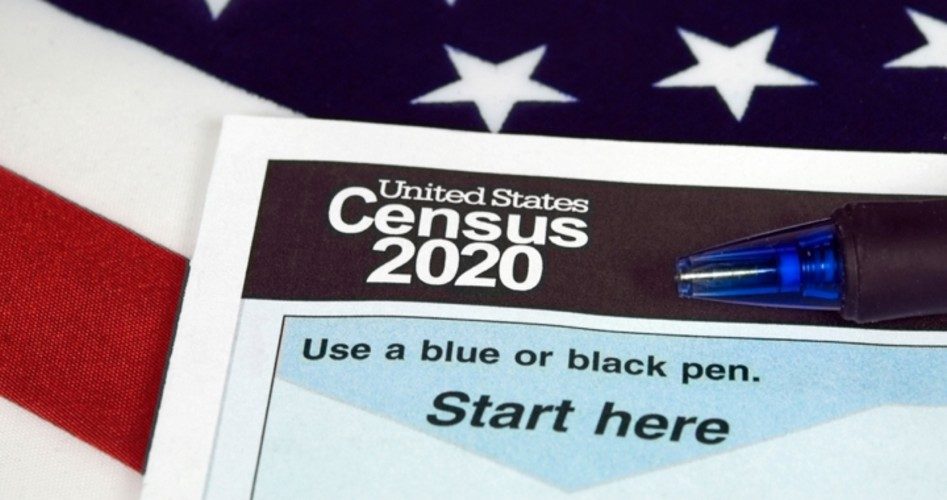
The U.S. Department of Commerce posted a news release on March 26 stating that a question on citizenship status will be reinstated for the 2020 decennial census questionnaire. The statement said the reason for asking this question will be to help enforce the Voting Rights Act (VRA).
Despite the fact that one of the reasons for gathering the citizenship data is to enforce the VRA, which was passed to enforce the voting rights of racial minorities — and should be seen as promoting civil rights — two of the most liberal attorneys general in the nation have filed suit (or plan to file suit) seeking to block the question from appearing on the census.
The release said that the citizenship question to be included in the census will be the same as the one that is asked on the yearly American Community Survey (ACS). (That survey asks of each household member: “Is this person a citizen of the United States?”) It noted that citizenship questions have also been included on prior censuses, notably, between 1820 and 1950, and almost every decennial census asked a question on citizenship in some form.
Last December, the Justice Department requested that the Census Bureau reinstate a citizenship question on the census form to provide what the government calls “citizenship voting age population” (CVAP) data. This data is not currently available from government surveys. The DOJ and the courts use CVAP data for the enforcement of Section 2 of the VRA, which protects minority voting rights.
The Census Act, through which Congress delegated to the secretary of commerce the authority to determine questions to be asked on the census questionnaire, requires that the list of census questions be submitted to Congress no later than March 31, 2018.
No sooner was the Commerce Department’s statement released, than one of the nation’s most radical attorneys general, California’s Xavier Becerra, said that he is filing a lawsuit against the Trump administration. In a tweet announcing his plans, Becerra asserted: “Including the [citizenship] question is not just a bad idea — it is illegal.”
Afterwards, Becerra followed through and filed suit against the administration in a U.S. District Court.
“Having an accurate Census count should be of the utmost importance for every Californian,” Becerra said in a statement quoted by The Hill. “The Census numbers provide the backbone for planning how our communities can grow and thrive in the coming decade. California simply has too much to lose for us to allow the Trump administration to botch this important decennial obligation.”
Becerra’s efforts were mirrored by New York Attorney General Eric Schneiderman, who said in a statement on March 27 that he would lead a multi-state effort against the Census Bureau question. In a statement, Schneiderman cited the 14th Amendment and the enumeration clause of the Constitution as potential areas for legal challenges.
“This move directly targets states like New York that have large, thriving immigrant populations — threatening billions of dollars in federal funding for New York as well as fair representation in Congress and the electoral college,” Schneiderman said in his statement.
A report in The Hill on the planned addition to the census questions cited research showing that more than 60 percent of the estimated 11 million illegal immigrants living in the United States live in just 20 metro areas across the country. Furthermore, 12 of those 20 metro areas are in blue states that backed Democratic nominee Hillary Clinton by wide margins in the 2016 presidential election.
The report noted that a 2017 study by the Pew Research Center indicated that more than a million illegal aliens live in the New York area, and a million more live in Los Angeles.
As for why Democrat political leaders oppose including the citizenship question in the census, they claim that that asking the question makes all immigrants — both legal and illegal — suspicious and fearful of participating in the census.
A Reuters report on the subject observed that surveys conducted in late 2017 revealed that some immigrants were afraid to provide information to U.S. Census workers because of fears about being deported.
Reuters quoted Kristen Clarke, president and executive director of the Lawyers’ Committee for Civil Rights Under Law, as saying, “This decision comes at a time when we have seen xenophobic and anti-immigrant policy positions from this administration.”
Reuters quoted a statement that Mikelyn Meyers, a researcher at the Census Bureau’s Center for Survey Measurement, made at a meeting of the bureau’s National Advisory Committee in November. The Reuters report stated:
Census researchers have said immigrants they interviewed spontaneously raised topics like the travel ban and the dissolution of Deferred Action for Childhood Arrivals, a program that has protected from deportation young immigrants brought to the country illegally as children.
One person, Meyers said, told government interviewers: “The possibility that the Census could give my information to internal security and immigration could come and arrest me for not having documents terrifies me.”
Therein lies the reason why politicians in the blue states that tend to vote for Democratic candidates are opposed to including the question about citizenship in the census. As we noted earlier, liberals argue that asking the question makes all immigrants suspicious and fearful of participating in the census. And large numbers of those immigrants live in blue states that backed Hillary Clinton in 2016; leaving these immigrants out of the census count will reduce the figures upon which electoral votes are apportioned to these states. As we saw in 2016, the electoral vote is critical in determining the winner in the presidential election.
Schneiderman made his awareness of this factor very clear when he said: “This move directly targets states like New York that have large, thriving immigrant populations — threatening billions of dollars in federal funding for New York as well as fair representation in Congress and the electoral college.”
We would, however, take exception to his use of the phrase “fair representation.” Just as having the census ask residents whether they are citizens does not in any way infringe upon the rights of those who are qualified to vote, neither does it deter anyone who is in the United States legally from participating in the census. Only those who are in the United States illegally should be afraid to provide information to census workers because of fears about being deported. If politicians in states such as California and New York think that they should receive more federal funding, greater representation in Congress, and more electoral votes because of the presence of large number of illegal aliens within their borders, then it is that expectation that is unfair — and unreasonable. The illegal aliens should be deported — not counted in the census.
Photo: liveslow/iStock/Getty Images Plus
Related articles:
Xavier Becerra, Radical Pick for California AG, Likely a Shoo-in
Vote Fraud Monitoring Group Says Three Million Noncitizens Voted in Presidential Election



